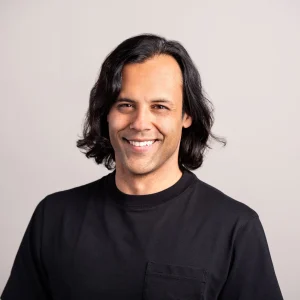It’s been seven months since Robinhood cofounder Baiju Bhatt entered stealth mode. Last March, he left his CCO perch at the online brokerage valued at $23 billion to quietly shift gears.
This week, he announced his new venture—the Silicon Valley space startup Aetherflux, which aims to beam solar power from space to remote regions where delivering power is expensive, challenging, or dangerous. The long-term goal is a kind of Starlink for solar energy—a network of low-orbiting satellites with solar arrays that capture sunlight and beam it by infrared laser to many small ground receivers. With an initial eye toward military applications, it hopes to one day supply renewable energy for commercial and civilian use.
“The mission is to take this idea of space solar power from the pages of science fiction and make it a real commercial thing,” says Bhatt, 40, the founder and CEO.

But first, baby steps. Bhatt, whose net worth is estimated as high as $2 billion, is seeding a prototype with roughly $10 million of his own money. He hopes to test it by early 2026, by transmitting a peak power of four kilowatts (which could power an average three-bedroom house) from an altitude of 342 miles to a 33-foot spot on the ground. If all goes well, the company will test increasingly larger satellites to deliver more power.
“We’re not just the power plant, but we’re also effectively creating the power lines,” says Bhatt. “Technically speaking, we think this is doable. But this is gonna be hard. Like really hard. And it’s not lost on us.”
From the mind of Asimov
Bhatt credits luminary science fiction author Isaac Asimov with the idea for space solar power in his 1941 short story, Reason. In the 1970s, NASA and the U.S. Department of Energy brainstormed ideas for a spacecraft with massive solar arrays in higher geostationary orbit transmitting microwaves from back to Earth. That never took hold, because of the size of the antennae dish needed to focus and receive the energy.
“We’re taking a different approach,” Bhatt notes on his blog. “We’re building a constellation of small satellites in low-Earth orbit working together to transmit power to many small ground stations. Instead of transmitting power through microwaves, we’ll use infrared lasers, allowing for higher power output and smaller footprints on Earth. This isn’t your grandfather’s space solar power concept.”
Bhatt isn’t the only one eyeing this technology. Though still experimental, space solar has been gaining traction with more urgent attempts to mitigate climate change and meet increasing energy needs. “One of the big problems with solar power is that it’s intermittent,” says Bhatt. From space, it’s constantly available, circumventing weather, cloud cover, and darkness. Last year, CalTech researchers became the first to beam solar power to Earth, while other studies are taking place across the globe. Bhatt is also an investor in Reflect Orbital, which wants to build space mirrors that reflect sunlight to solar farms on Earth at night.
Back to his roots
Despite Bhatt’s success with Robinhood, this venture is very much a return to his first passion, one that propelled him to Stanford University for degrees in physics and mathematics.
“I’ve had a love of space my whole life. I grew up around this stuff,” says Bhatt, whose father worked at NASA’s Langley Research Center. “I had this dream that I wanted to do space eventually.”
The company name does not come from the Magic, the Gathering card Aetherflux Reservoir, though Bhatt loves the game. Instead, it comes from his other passion for historical science: an outdated physics theory that proposed the existence of “aether” as a transmission medium for electromagnetic or gravitational forces.
Bhatt set up shop in San Carlos, CA, hiring 10 employees from companies like SpaceX and Luminar, and purchased a 330-lb. satellite bus from Apex (another of his investments) to carry the payload his team is designing and building.
It’s a daunting journey ahead, especially considering most folks who hit the entrepreneurial jackpot might have just taken the money and chilled.
“I’m not wired that way,” he says. “I’m constantly tinkering and building things. It’s the going from nothing to something.”
Accedi per aggiungere un commento
Altri post in questo gruppo

One of the central arguments in the ongoing antitrust trial against G

The AI revolution is redefining business and tech leadership—and no one is standing more squarely on the front lines than product leaders.
Once seen as a behind-the-scenes role, the CPO

It has taken a little over five months and has been

Dubai, the go-to destination for influencers, is now doubling down on its biggest market with the launch of its very own “influencer academy.”
Jointly funded by the Dubai Department of E

A new report has uncovered a community of Roblox players who digitally re-create and “play” through real-life school shootings.
Known as “Active Shooter Studios,” or A.S.S., the group ha

Apple aims to make most of its iPhones sold in the United States at factories in

